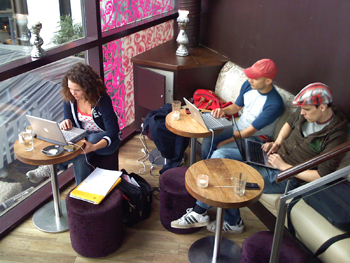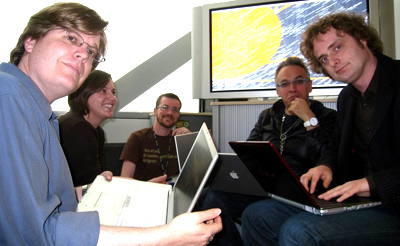SoftWhere 2008: UC San Diego Researchers Pioneer Emerging Field of 'Software Studies'
San Diego, CA, April 28, 2008 -- A newly-formed initiative at the University of California, San Diego will host a workshop to draw up a roadmap for the development of software studies as a new movement and field of academic inquiry.
|
"Google searches and Amazon recommendations, airline flight paths and traffic lights, email and your phone - our culture runs on software," said Lev Manovich, a professor of Visual Arts at UC San Diego and director of the new Software Studies Initiative at UC San Diego. The initiative is a partnership of the California Institute for Telecommunications and Information Technology (Calit2) and the Center for Research in Computing and the Arts (CRCA). "We think of software as a layer that permeates all areas of contemporary society. So if we want to understand contemporary techniques of control, communication, representation, simulation, analysis, decision-making, memory, vision, writing and interaction, our analysis cannot be complete until we consider this software layer."
To define this emerging field, organizers will stage SoftWhere 2008, the first Software Studies Workshop @ UCSD. The invitation-only event will take place May 21-22 at Calit2 on the UCSD campus. Calit2 is a state- and industry-sponsored partnership of UCSD and UC Irvine. At the conclusion of SoftWhere 2008, Calit2 at UC Irvine will host an affiliated meeting: the second annual conference of the Humanities, Arts, Science and Technology Advanced Collaboratory (HASTAC). HASTAC II begins in the evening of May 22 and all day May 23, in the Calit2 Building at UC Irvine, and the conference will wrap up on May 24 at UCLA.
|
Confirmed participants include Matthew Fuller, who organized the world's first software studies workshop in 2006 in Rotterdam. Fuller is also the editor of the first book with the term in its title: "Software Studies: A Lexicon". The anthology will be published later this year by The MIT Press. Fuller is the David Gee Reader in Digital Media at the Centre for Cultural Studies, in the University of London's Goldsmiths College.
The largest contingent of confirmed participants will come from UC campuses, including UCLA, UC Santa Cruz, UC Santa Barbara, UC Irvine and UC San Diego. Other attendees hail from MIT, Georgia Tech, University of Maryland, USC, Santa Clara University and other institutions. [See below for partial list of confirmed workshop participants.]
|
Software studies projects already underway at UCSD include: a study of the key applications in the history of 'software culture', such as SketchPad and AfterEffects; development of methodologies and software tools for the study of software from humanities and social sciences perspectives; and adapting techniques such as information visualization, visual analytics, image processing and data mining for the study of media and visual culture (including computer games, video, cinema, photography and web design).
"We live in a software culture -- that is, a culture where the production, distribution, and reception of most content is mediated by software," said Lev Manovich. "And yet, most creative professionals do not know anything about the intellectual history of software they use daily, be it Microsoft Word, Photoshop, Final Cut, After Effects, Flash, or other programs."
The Software Studies Initiative @ UCSD aims to disseminate a broad vision of software studies through workshops, publications, and lectures conducted at UCSD and disseminated via the Internet and in hard-copy publications.
"Calit2 develops new fields of inquiry by investing in faculty, students and programs on the cutting edge of interdisciplinary work," said Ramesh Rao, director of the UCSD division of Calit2. "We are launching this initiative because UCSD and Calit2 have the unique opportunity to help shape how this software layer will be understood and studied by other universities, programs, and centers in years to come."
"Software is largely invisible to most academics, artists, and cultural professionals interested in information technology and its cultural and social effects," said Sheldon Brown, director of CRCA and a professor of visual arts. "Without greater attention to the way software affects all areas of contemporary society, we are in danger of dealing only with effects rather than causes - the output that appears on a computer screen rather than the programs and social cultures that produce these outputs."
UC San Diego boasts world-renowned research in digital art, computer music and digital theory, with nearly 30 full-time faculty members working in these areas (and one of the few graduate programs in the United States where a student can do a Ph.D. in digital theory). "By being the first initiative in the world in the emerging field of software studies, we will further strengthen UCSD's international reputation as an innovator in digital media, art, and theory," said Sheldon Brown, director of CRCA and a professor of Visual Arts. "We also have facilities for this type of work that are unmatched anywhere on the West Coast, including the labs, studios and performance spaces of Calit2, CRCA and different academic departments across campus."
"We are using humanistic methods to interpret the operations of software in powerful new ways," said Noah Wardrip-Fruin, a professor of communication and associate director of the Software Studies Initiative @ UCSD. "These new ways have the potential to deepen the scholarly discussion, inform future system design, and help the public better understand the software that shapes their everyday lives." The initiative partnered with Wardrip-Fruin and the MIT Press on his groundbreaking effort to use a blog-based peer review for his new book, "Expressive Processing". "It's an example of us being involved in software development that helps pioneer new models of software use in the humanities and social sciences," he noted.
"Calit2 is developing innovative infrastructures for the next paradigm of scientific research based on remote collaboration between teams of scientists, working with very large data sets, and access to state-of-the-art computing, storage, networking and display technologies," said Jeremy Douglass, a postdoctoral researcher with the Software Studies Initiative who is working full-time on organizing the SoftWhere workshop. "How can we apply this paradigm for humanities and social science research? How can the latest tools in data analysis and visualization be used in relation to cultural data? How can we take advantage of unprecedented amounts of cultural data available on the web to begin analyzing culture in new ways?"
Related Links
SoftWhere 2008
Software Studies Initiative
CRCA
HASTAC
HASTAC II Conference
Software Studies: A Lexicon (MIT Press)
Expressive Processing - Blog-based Peer Review
Media Contacts
Doug Ramsey, 858-822-5825, dramsey@ucsd.edu
Workshop Contact: Jeremy Douglass, jedouglass@ucsd.edu



